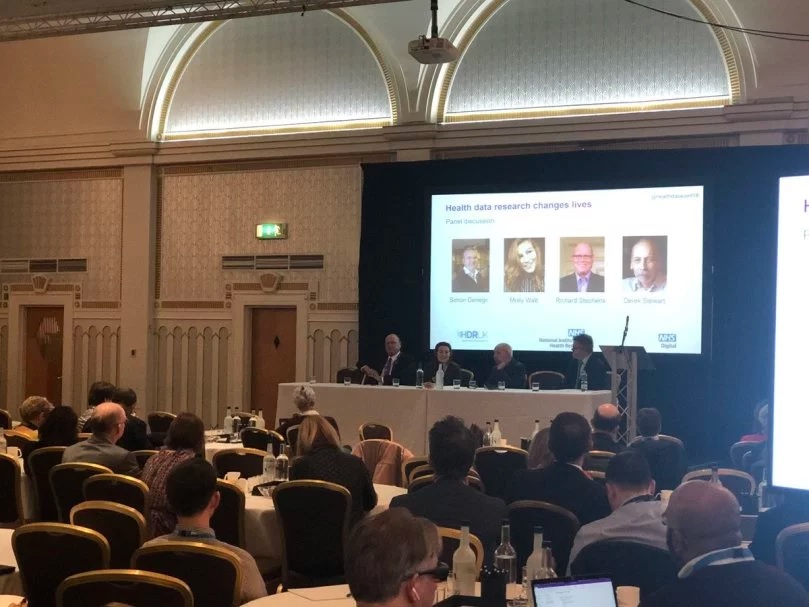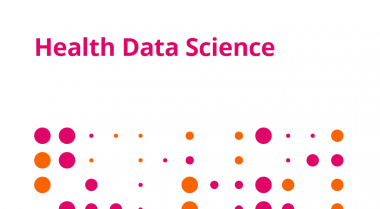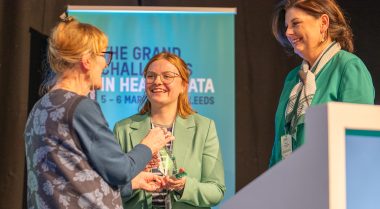A week of public engagement, an industry showcase…and high performance computing!
4 December 2018


Author: Professor Andrew Morris, Director of Health Data Research UK
“I am alive today because my clinicians were active in research” were the words that kicked off the Health and Care Data: Improving Lives through Research Conference, co-hosted by NIHR, NHS Digital and HDR UK in Leeds yesterday. It was a high impact start to a terrific event that celebrated how health and care data that is being used for research that has changed lives.
The patient panel, chaired by Simon Denegri and featuring Derek Stewart, Richard Stephens and Molly Watt started the day – many people commented that it was disruptive to put “the patients on first”. It added greatly to the day, and stimulated ideas about how we can make health data research across the UK more efficient, effective and meaningful. Ideas including how we promote research as core NHS business, how to simplify the approvals process, and approaches to amplifying the “so what” in order to be much better to talk about benefits to patients and populations.
The delegates, in a very lively balloon debate discussed whether various issues including training, genomics, digital maturity of NHS, political leadership and AI are the most important if health data research is to scale at pace across the UK, and unanimously concluded that patient engagement and co-production is the most important for success. Well done Nathalie Banner, of Understanding Patient Data, for convincing the audience! This resonates with clinical medicine, in the words of William Osler “the good physician treats the disease; the great physician treats the patient who has the disease”. Perhaps it is time to deploy this co-production approach to research?
The week also saw a tremendous Industry Symposium hosted at The Royal College of Physicians in London, which is celebrating its 500th birthday. The purpose of the day was to think through what the purpose and functions of an internationally competitive Digital Innovation Hub Programme, as part of the UKRI Industrial Strategy Challenge Fund, would look like if we are to be the catalyst for trustworthy research and innovation at scale.

Lord O’Shaughnessy, a relentless supporter of Digital Innovation, set a high bar in outlining the challenge. The meeting, co-hosted by ABPI, the Medicines Discovery Catapult, the Office of Life sciences, the BIA and HDR UK, is one of several in our quest to determine the needs of industry, large and small, from health data research across the UK. It is clear there is huge enthusiasm and an appetite to “do things differently”, drawing upon the expertise of the NHS, academia and industry with public engagement.
The report of the meeting will be available on our website shortly and the dialogue phase continues into 2019, with a partnership meeting with the Association of Medical Research Charities on the 22nd January 2019.
I was also struck this week by the pace of change in technology, and how we are seeing rapid innovation in applying high performance computing to medicine and health care. This year’s winner of the Gordon Bell prize awarded for the best application of High Performance Computing globally, was a team from the Oakridge National Laboratory for a paper that looked at the genetic architecture of opioid dependency. The team processed a vast amount of genetic data (750,000 GWAS) and one billion medical records to identify genes that may be more susceptible to pain and opioid addiction. The analysis was at the “exa-scale”, performing 2.4 billion billion analyses per second! It took three hours to complete whereas a conventional computer would take up to 15 years! I sense we are in the foothills of understanding the potential impact and application to health care, as we witness the progress in computation, and the potential rewards as we apply this new knowledge to challenges in science, engineering and large scale data analytics.
Exciting times indeed!



